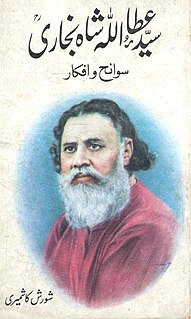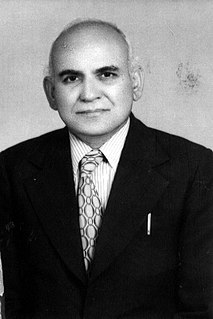
The Pakistan Movement was a political movement in the first half of the 20th century that aimed for the creation of Pakistan from the Muslim-majority areas of British India. It was connected to the perceived need for self-determination for Muslims under British rule at the time. Muhammad Ali Jinnah lead this movement after the Lahore Resolution was passed by All-India Muslim League, on March 23rd, 1940.

The Lahore Resolution, also called Pakistan resolution or declaration of independence of Pakistan, was written and prepared by Muhammad Zafarullah Khan and was presented by A. K. Fazlul Huq, the Prime Minister of Bengal, was a formal political statement adopted by the All-India Muslim League on the occasion of its three-day general session in Lahore on 22–24 March 1940. The resolution called for independent states as seen by the statement:
That geographically contiguous units are demarcated regions which should be constituted, with such territorial readjustments as may be necessary that the areas in which the Muslims are numerically in a majority as in the North Western and Eastern Zones of (British) India should be grouped to constitute ‘independent states’ in which the constituent units should be autonomous and sovereign.

Syed Muhammad Zauqi Shah (1878–1951) was a Sufist scholar considered a Waliullah or Sufist saint. He graduated from Aligarh University in India. A member of the Chishti Order of Sufi, his work combined merits of Islamic scholarship and modern knowledge.

Sardar Abdur Rab Nishtar was a Muslim League stalwart, a Pakistan movement leader and activist and later on a Pakistani politician from North-West Frontier Province.

Syed Ata Ullah Shah Bukhari , was a Muslim Hanafi scholar, religious and political leader from the Indian subcontinent. He was one of the Majlis-e-Ahrar-e-Islam's founding members. His biographer, Agha Shorish Kashmiri, states that Bukhari's greatest contribution had been his germination of strong anti-British feelings among the Indian Muslims. He is one of the most notable leaders of the Ahrar movement which was associated with opposition to Muhammad Ali Jinnah and opposition to the establishment of an independent Pakistan, as well as opposition to the Ahmadiyya Movement. He is considered as a legendary rhetoric, which made him famous among the Muslims.
Malik Barkat Ali was an Indian Muslim politician, lawyer and journalist.
Fatima Begum is a revered woman of the Pakistan Movement.

Majlis-e Ahrar-e Islam, also known in short as Ahrar, is a religious Muslim political party in the Indian subcontinent that was formed during the British Raj on 29 December 1929 at Lahore.
Mazhar Ali Azhar was a politician in British India and later Pakistan, and one of the founders of Majlis-e-Ahrar-ul-Islam. He was elected three times to the Punjab Assembly, took part in the Madhe Sahaba Agitation in Lucknow, and became a prominent opponent to the partition of India.

The Jinnah family was a political family of Pakistan. Jinnahs have played an important role in the Pakistan Movement for creation of Pakistan, a separate country for Muslims of India. The family held the leadership of All-India Muslim League, and its successor, Muslim League, until it dissolved in 1958 by martial law. Originally from a Gujarati Grand father Hindu merchant Premjibhai Thakkar Khoja background, they moved to Karachi from Kathiawar, Bombay Presidency in the 19th century.

Manzoor Ul Haq Siddiqi was a Pakistani educationist, historian and an author. He served in Cadet College Hasan Abdal from 1954 until his retirement in 1980.
The family of head of state and government in Pakistan is an unofficial title for the family of the head of state or head of government of a country. In Pakistan, the term First Family usually refers to the head of state or head of government, and their immediate family which comprises their spouse and their descendants. In the wider context, the First Family may comprise the head of state or head of government's parents, siblings and extended relatives.

Khan Jalaluddin Khan, aka Jalal Baba, was a Muslim League stalwart and a Pakistan movement activist who served as the 8th Interior Minister of Pakistan under the Premiership of Feroz Khan Noon.
Syed Khalil-ur-Rehman, خلیل الرحمان, was the 1st Minister of State for Defence Pakistan during the premiership of Khawaja Nazimuddin. He was also a close companion of Mr. Muhammad Ali Jinnah and a senior member of Pakistan Muslim League.
Jamaat Ali Shah (1834–1951) was a Sufi of the Naqshbandi order and an author. He was President of All India Sunni Conference and the leader of the Shaheed Ganj Mosque. He was an influential leader of the Pakistan Movement.

ʿAbd al-Ḥāmid al-Qādirī al-Badāyūnī was a traditional Islamic scholar, Sufi master, poet, and leader from Pakistan. He was the founder of the Islamic college Jamia-Talimat-e-Islamiya located in Karachi.

Khan Muhammad Arif Khan Rajbana Sial was a veteran politician, feudal lord and tribal chieftain from Badh Rajbana, Shorkot, Pakistan.










